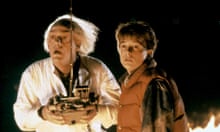We didn't come from a very filmy family. I'd only seen two movies before Kes. One was The Poseidon Adventure – all I can remember is going in my pyjamas (I was ill) and being cold – and the other the film of Steptoe and Son. It was a friend's birthday, and I think (my memory might be playing a sick trick here) Albert Steptoe takes a bath in a tin tub and I found it weirdly thrilling.
Then came Kes. By now I was 12 years old, and at a special school, Crumpsall Open Air – or, as we pupils called it, Crumpsall Open Air for Mongs (no, I won't attempt to defend that). The pupils were an unlikely mix of juvenile delinquents, chronic asthmatics, kids with learning difficulties, cerebral palsy, Down's syndrome, and those who had rare diseases.
I was never sure why it was called an open-air school. But we certainly spent a lot of time in the open air – every afternoon playing football outside except for when the weather was too bad. One day it was pissing down, and we were forced inside. The teacher put on a film to keep us quiet. This was 1974, and the movie was already ancient (five years old); it had been made by a man who called himself Kenneth Loach. Didn't sound promising.

But there wasn't a squeak. We'd never seen anything like Kes. Based on the Barry Hines novel A Kestrel for a Knave it is about skinny Billy Casper (brilliantly played by David Bradley making his screen debut) who lived in a northern coal-mining community. Billy hated school like we did, he messed about and felt isolated like we did, and wondered what the point of everything was. Then he hooked up with a kestrel, learned to train it and love it, and discovered not only a purpose in life but an ability to communicate that he had never had before.
None of us had kestrels, but we all related to the film. Most fictional kids we'd seen on the telly were posh and public-school, like Tom Brown. But Kes wasn't about privilege – just the opposite. Working-class boys speaking in working-class accents, and sometimes muttering so much that you couldn't make out what they were saying. The language was colloquial, the film was lit like the real world, the actors didn't look like actors.
Back then, I didn't know Ken Loach was a radical film-maker with a complete cinematic philosophy of his own: that he made people mumble deliberately, and only used natural light (the cameraman was the brilliant Chris Menges) and non-professional actors alongside professional actors to make things naturalistic. Nor did I know that he didn't tell the actors or non-actors what was going to come next, so they were as shocked or as delighted (shocked, normally – after all, this is classic Loach) as we were when it happened.

There are so many great scenes in the film – training the kestrel, Billy's inspirational talk to the class, his brother's terrible betrayal – but my favourite is the football. It could have been us playing at Crumpsall Open Air. Brian Glover, the games teacher who thinks he's Bobby Charlton and takes every free kick and blows his whistle when any of the kids tackle him, looked and acted like the benign bully Mr Reynolds who took us for games. This was life as we knew it. When Billy was stuck in goal because he was a useless outfield player, I understood how he felt. They stuck me in goal too, but I had a very different approach to Billy. Goalkeeping became as significant for me as the kestrel did for Billy. I flung myself at Doc-Martined feet, dived on gravel and bloodied my knees every day in my desperate attempts to prove myself to the hard kids at school.
Now I know that you can look back to the Italian neorealists and the Czech new wave, and find the roots of Kes in the genius of, say, Roberto Rossellini and Jiri Menzel. But that didn't make any odds back in the 70s when I first saw it, and doesn't now. What matters is that Kes is a brilliant film, and one that still shows the best movies can be about everyday lives.





Comments (…)
Sign in or create your Guardian account to join the discussion